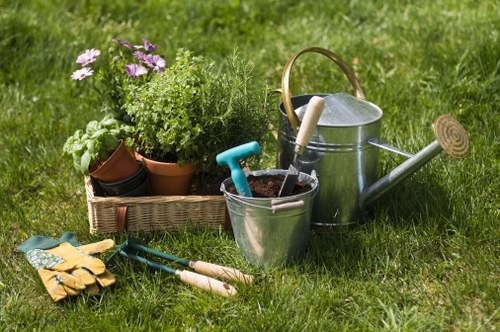Effective Oil Stain Removal for Driveways in Tooting Bec

Oil stains on your driveway can be both unsightly and stubborn. Residents of Tooting Bec understand the frustration of dealing with these persistent marks. Whether it's from a vehicle leak or accidental spills, removing oil stains requires the right techniques and products to restore the beauty of your driveway.
In this comprehensive guide, we'll explore various methods to eliminate oil stains effectively. From simple household solutions to professional treatments, you'll find the best approach to suit your needs and budget.
Understanding the nature of oil stains is crucial in selecting the appropriate removal method. Different types of driveways, such as concrete, asphalt, or paving stones, may require specific treatments.
Why Oil Stains Occur on Driveways

Oil stains typically occur due to vehicular leaks, such as engine oil, transmission fluid, or brake fluid. These leaks happen over time as vehicles age or experience mechanical issues. Additionally, accidental spills from improperly stored oil containers can contribute to driveway staining.
Environmental factors like rain and sunlight can make oil stains more challenging to remove. Rain can cause the oil to seep deeper into the driveway material, while UV rays from the sun can cause the oil to oxidize, making it harder to eliminate.
Regular maintenance and prompt cleaning of spills can help prevent oil stains from setting. However, once a stain has penetrated the driveway surface, specialized treatments are often necessary.
DIY Oil Stain Removal Methods

For homeowners in Tooting Bec looking to tackle oil stains themselves, several do-it-yourself methods can be effective. These solutions are cost-effective and use readily available household items.
Baking Soda and Dish Soap
A mixture of baking soda and dish soap can break down oil residues. Sprinkle baking soda generously over the stain, followed by dish soap. Scrub the area with a stiff brush and let it sit for a few minutes before rinsing with water.
Cat Litter or Absorbent Clay
Spread cat litter or absorbent clay over the oil stain to soak up excess oil. Let it sit overnight, then sweep it away. This method helps in lifting the oil from the driveway surface.
White Vinegar
White vinegar is an excellent natural cleaner that can help remove oil stains. Spray or pour white vinegar directly onto the stain and let it sit for about 30 minutes. Scrub the area and rinse thoroughly with water.
- Pros: Environmentally friendly, inexpensive.
- Cons: May require multiple applications for stubborn stains.
Commercial Oil Stain Removers

When DIY methods aren't sufficient, commercial oil stain removers offer a more potent solution. These products are specifically formulated to target and break down oil residues on various driveway materials.
Powdered Cleaners
Powdered cleaners can be applied to oil stains and left to sit for a specified period before being scrubbed and rinsed off. They are effective on both fresh and old stains.
Foaming Cleaners
Foaming cleaners penetrate deep into the driveway surface, lifting the oil out of the pores. They are easy to apply and often require less scrubbing compared to powdered cleaners.
Enzyme-Based Cleaners
Enzyme-based cleaners use natural enzymes to break down oil molecules. They are eco-friendly and safe for use around plants and pets.
- Pros: Highly effective, especially for tough stains.
- Cons: Can be more expensive than DIY solutions.
Professional Oil Stain Removal Services

For persistent or extensive oil stains, hiring a professional oil stain removal service in Tooting Bec might be the best option. Professionals have access to specialized equipment and advanced cleaning agents that can effectively eliminate stubborn stains.
Pressure Washing
Professional pressure washing uses high-pressure water jets to remove oil stains from driveways. This method is highly effective, especially for large surface areas.
Hot Chemical Extraction
This technique involves using heated chemical solvents to dissolve oil stains. The mixture is then extracted using specialized machinery, ensuring thorough removal.
Sealing and Maintenance
After stain removal, professionals often recommend sealing the driveway to prevent future oil penetration. Regular maintenance can extend the lifespan of your driveway and keep it looking pristine.
- Assessment of the stain severity.
- Selection of appropriate removal method.
- Application of cleaning agents.
- Extraction and rinsing.
Preventing Future Oil Stains
Preventing oil stains is often easier than removing them. Implementing simple preventive measures can keep your driveway clean and free from unsightly marks.
- Regular Vehicle Maintenance: Ensure your vehicle is regularly serviced to prevent leaks.
- Use Car Mats: Place car mats inside your vehicle to catch any oil drips.
- Prompt Cleanup: Immediately clean any spills to prevent oil from setting into the driveway.
- Seal Your Driveway: Apply a high-quality sealant to your driveway to create a protective barrier against oil and other stains.
- Proper Storage: Store oil containers securely to avoid accidental spills.
Choosing the Right Sealant
Selecting the appropriate sealant depends on your driveway material. Asphalt driveways benefit from asphalt-based sealants, while concrete driveways require concrete sealants. Always follow the manufacturer's instructions for the best results.
Environmental Considerations
When removing oil stains, it's essential to consider the environmental impact of the cleaning methods used. Opting for eco-friendly products and practices can minimize harm to the surrounding ecosystem.
Eco-Friendly Cleaners
Choose biodegradable and non-toxic cleaners to reduce environmental pollution. Enzyme-based and vinegar-based solutions are excellent choices for environmentally conscious homeowners.
Proper Disposal
Dispose of used cleaning products and materials responsibly. Avoid letting contaminated water enter storm drains, as it can harm local waterways.
Local Regulations
Be aware of any local regulations regarding the disposal of oil and cleaning agents. Following these guidelines ensures compliance and protects the environment.
- Use biodegradable products.
- Avoid harsh chemicals.
- Implement water runoff control.
Top Areas Near Tooting Bec for Oil Stain Removal Services
Residents of Tooting Bec have access to a range of professional oil stain removal services in nearby areas. Each area offers unique advantages and specialized services to meet various needs.
- Tooting: Just north of Tooting Bec, Tooting offers quick response services with local expertise.
- Balham: Known for its reliable and affordable stain removal professionals.
- Sainte: A short distance away, Sainte provides eco-friendly cleaning options.
- Colliers Wood: Offers comprehensive services, including sealing and maintenance.
- Wandsworth: Has access to advanced cleaning technologies for stubborn stains.
- Earlsfield: Known for its efficient and prompt service providers.
- South Wimbledon: Provides specialized treatments for various driveway materials.
- Raynes Park: Offers a range of services from DIY supplies to professional cleaning.
- West Dulwich: Known for its high-quality eco-friendly solutions.
- Sullivan's Island: Provides personalized services tailored to specific stain issues.
- Streatham: Offers both residential and commercial oil stain removal services.
- Beckenham: Accessible options with flexible scheduling for busy homeowners.
- Putney: Combines traditional and modern cleaning methods for effective results.
- Mitcham: Known for its thorough and meticulous cleaning practices.
- Wimbledon: Offers premium services with guarantees on stain removal.
Choosing the Right Method for Your Driveway
Selecting the appropriate oil stain removal method depends on several factors, including the driveway material, stain severity, and your budget.
Assessing Stain Severity
Determine whether the stain is fresh or old. Fresh stains are generally easier to remove, while older stains may require more intensive treatments.
Driveway Material
Different materials respond better to specific cleaning methods. For instance, concrete driveways require different treatments compared to asphalt or paving stones.
Budget Considerations
DIY methods are cost-effective but may require more time and effort. Professional services, while more expensive, offer efficient and guaranteed results.
Cost Comparison:
- DIY Methods: Low cost, requires household items.
- Commercial Cleaners: Moderate cost, effective for various stains.
- Professional Services: Higher cost, best for extensive or stubborn stains.
Long-Term Solutions
Investing in preventive measures, such as sealing your driveway and regular maintenance, can reduce the likelihood of future oil stains and extend the lifespan of your driveway.
Conclusion
Dealing with oil stains on your driveway in Tooting Bec doesn't have to be a daunting task. Whether you choose a DIY method, use commercial products, or hire a professional service, effective stain removal is achievable. By understanding the causes of oil stains and implementing preventive measures, you can maintain a clean and attractive driveway for years to come.
Remember to assess the severity of the stain, consider the driveway material, and choose the method that best fits your needs and budget. With the right approach, your driveway will be free from unsightly oil stains, enhancing the overall curb appeal of your home.
Frequently Asked Questions
1. How soon should I treat an oil stain on my driveway?
It's best to treat oil stains as soon as possible. Fresh stains are easier to remove and require less effort. Prompt action prevents the oil from seeping deeper into the driveway material.
2. Can I use household cleaners to remove oil stains from an asphalt driveway?
Yes, household cleaners like baking soda and dish soap can be effective on asphalt driveways. However, for more stubborn stains, commercial or professional treatments may be necessary.
3. Is pressure washing safe for all types of driveways?
Pressure washing is generally safe for most driveway materials, including concrete and asphalt. However, excessive pressure can damage certain surfaces like delicate pavers. It's advisable to consult with a professional before proceeding.
4. How can I prevent oil stains from recurring on my driveway?
Regular vehicle maintenance to prevent leaks, using car mats inside your vehicle, promptly cleaning spills, and sealing your driveway are effective measures to prevent oil stains from recurring.
5. Are there environmentally friendly oil stain removal options available?
Yes, there are eco-friendly options such as enzyme-based cleaners, white vinegar, and baking soda. These alternatives minimize environmental impact while effectively removing oil stains.


